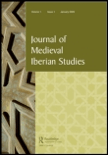
Journal of Medieval Iberian Studies
Scope & Guideline
Unveiling the Secrets of a Pivotal Historical Era
Introduction
Aims and Scopes
- Interdisciplinary Research:
The journal emphasizes an interdisciplinary approach, integrating methodologies from history, archaeology, literature, and cultural studies to provide a comprehensive understanding of medieval Iberian society. - Focus on Cultural Interactions:
A core area of the journal is the exploration of cultural exchanges among Christian, Muslim, and Jewish communities, highlighting how these interactions shaped social norms, practices, and identities. - Historical Analysis of Power Dynamics:
The journal frequently examines political structures, authority, and governance in medieval Iberia, analyzing how these elements influenced societal changes and conflicts. - Social History and Daily Life:
Research often delves into the everyday lives of individuals and communities, addressing themes such as gender roles, economic practices, and communal rituals. - Material Culture and Heritage:
The journal also investigates material culture, including architecture, artifacts, and manuscripts, to uncover insights into the historical context and cultural significance of medieval Iberian societies.
Trending and Emerging
- Death and Funerary Practices:
There is a notable increase in research focusing on death, mourning, and funerary rites across different communities, emphasizing how these practices reflect social identities and cultural values in medieval Iberia. - Digital Humanities and Manuscript Studies:
An emerging trend involves the application of digital humanities methods to manuscript studies, showcasing innovative approaches to understanding and preserving medieval texts and their cultural contexts. - Gender Studies and Feminist Perspectives:
The journal is seeing a rise in works that explore gender dynamics and the roles of women in medieval society, revealing how these perspectives contribute to a more nuanced understanding of power and social structures. - Economic History and Social Networks:
Recent publications increasingly address economic practices and the development of social networks, focusing on how these factors influenced community dynamics and individual agency in medieval Iberia. - Cultural Memory and Identity Formation:
A growing interest in how cultural memory and identity were constructed and negotiated in medieval Iberia reflects an interdisciplinary approach that combines history, sociology, and cultural studies.
Declining or Waning
- Traditional Feudal Structures:
While historical analyses of feudalism were once prominent, there seems to be a decline in papers focusing exclusively on feudal structures and relationships, as scholars increasingly turn their attention to broader socio-economic dynamics. - Visigothic Studies:
Research dedicated specifically to the Visigothic period, such as its political and cultural frameworks, has become less frequent, possibly indicating a shift towards later medieval periods that offer more complex narratives of cultural interaction. - Military History and Warfare:
Although military history was a significant theme, recent publications suggest a decline in this focus, with more attention being given to social and cultural aspects of medieval life rather than purely military engagements.
Similar Journals

Reti Medievali Rivista
Exploring the Depths of Medieval HistoryReti Medievali Rivista, published by FIRENZE UNIV PRESS, stands as a distinguished platform in the field of history, specifically focusing on the medieval period. With an ISSN of 1593-2214, this journal has embraced Open Access since 2000, ensuring that its scholarly content is readily available to researchers, students, and professionals worldwide. Based in Italy, the journal boasts a Q2 ranking in the Category of History according to the 2023 quartiles, reflecting its significant impact and contribution to the discipline. With a Scopus rank of #809 out of 1760 in the Arts and Humanities category, it sits comfortably within the 53rd percentile, affirming its quality and relevance in the academic community. The journal's scope encompasses a wide range of topics related to medieval studies, making it an invaluable resource for those seeking in-depth research and analysis in this pivotal era of history. Scholars are encouraged to explore its diverse articles and insights, further enriching the dialogue surrounding medieval scholarship.
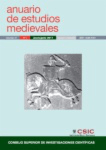
Anuario de Estudios Medievales
Exploring the Depths of Medieval HistoryAnuario de Estudios Medievales is an esteemed academic journal dedicated to the field of Medieval Studies, published by the Consejo Superior de Investigaciones Científicas (CSIC) in Spain. With an ISSN of 0066-5061 and an E-ISSN of 1988-4230, the journal has been offering open access to researchers since 1996, fostering a collaborative and inclusive scholarly environment. Recognized for its high impact, it holds a commendable Q1 ranking in History as of 2023, reflecting its influence in the academic community. The journal encompasses a rich array of topics within medieval history, making it a vital resource for historians, scholars, and students alike who seek to explore and understand the complexities of the medieval period. With its indexed presence in Scopus, where it ranks 557th among 1760 in the Arts and Humanities category, Anuario de Estudios Medievales stands as a cornerstone publication, bridging historical inquiry and contemporary research in Medieval Studies.

Tiempos Modernos-Revista Electronica de Historia Moderna
Connecting research and dialogue in modern historical studies.Tiempos Modernos - Revista Electronica de Historia Moderna is a leading open-access journal dedicated to the exploration and analysis of modern historical narratives, critical scholarship, and interdisciplinary approaches. Published by ASOC MUNDOS MODERNOS, this esteemed journal has been a vital resource for researchers, professionals, and students in the field of modern history since its inception in 2000. With its ISSN 1699-7778 and E-ISSN also 1699-7778, the journal aims to foster the dissemination of contemporary academic work and dialogues that shape our understanding of modern historical contexts. Embed your research within the broader scholarly conversation through this platform, and benefit from its commitment to open access, making academic achievements widely accessible and impactful. Located in Madrid, Spain, Tiempos Modernos stands out within the historical community by promoting innovative research and enhancing the visibility of modern historical studies.
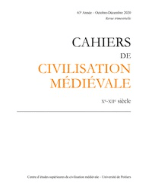
CAHIERS DE CIVILISATION MEDIEVALE
Fostering Dialogue in Medieval StudiesCAHIERS DE CIVILISATION MEDIEVALE is a distinguished scholarly journal focusing on the multifaceted aspects of medieval civilization, including its history, literature, visual arts, and performing arts. Published by the CENTRE ETUD SUPERIEUR CIV MED in France, this journal serves as a vital resource for researchers, professionals, and students striving to deepen their understanding of the medieval period. Although the journal’s impact factor and HIndex are not explicitly listed, it has been categorized in Q4 for 2023 in key areas such as History and Literature, indicating its role within niche academic discussions. With content spanning converged publication years from 2002 to 2014 and 2017 to 2023, CAHIERS DE CIVILISATION MEDIEVALE aims to foster a rich dialogue among scholars in the field, while its accessibility options provide a pathway for the dissemination of knowledge. Dive into the intricate world of medieval studies through this essential publication, which seeks to elevate the discourse and provide a platform for innovative research.
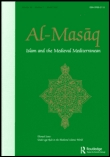
Al-Masaq-Journal of the Medieval Mediterranean
Navigating the Depths of History and CultureAl-Masaq: Journal of the Medieval Mediterranean is a premier academic journal published by Routledge Journals, Taylor & Francis Ltd, focusing on the intricate tapestry of medieval Mediterranean studies. With its first publication dating back to 1988, this journal invites researchers and scholars to explore the rich history, culture, and religious dynamics that shaped the Mediterranean region during the medieval period. The journal is strategically indexed and ranks in the Q3 quartile for both History and Religious Studies, positioning it within the top 25% of similar publications. Al-Masaq aims to bridge the gaps between various disciplines related to medieval studies, promoting interdisciplinary discourse and scholarly collaboration. Though it operates under a subscription model, the journal remains accessible to the academic community, fostering a robust dialogue on vital historical insights and research developments. Its esteemed contributors and comprehensive peer-review process underscore Al-Masaq’s importance as a significant platform for both emerging and established voices in the field.
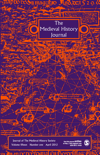
MEDIEVAL HISTORY JOURNAL
Illuminating the Complexities of the Middle AgesWelcome to the MEDIEVAL HISTORY JOURNAL, a prominent academic platform published by SAGE PUBLICATIONS INC, dedicated to advancing the field of medieval studies. Since its inception in 1998, this journal has established itself as a vital source of scholarly discourse, offering a rich array of articles that cover various aspects of medieval history, from cultural and societal developments to the intricate interplay of politics and religion. With an impressive rank of #568 out of 1760 in the Scopus Arts and Humanities History category and a respectable 67th percentile, the journal exemplifies rigorous academic standards and impactful research. Although it operates primarily under subscription access, its contributions are indispensable for researchers, professionals, and students seeking to deepen their understanding of the medieval era. The journal's ongoing commitment to publishing cutting-edge research makes it a cornerstone for anyone passionate about exploring the complexities of medieval history.

Erasmo-Revista de Historia Bajomedieval y Moderna
Exploring the Depths of Medieval and Modern HistoryErasmo-Revista de Historia Bajomedieval y Moderna is a prominent academic journal dedicated to the exploration of medieval and early modern history, published by UNIV VALLADOLID, SECRETARIADO PUBLICACIONES. With an E-ISSN of 2341-2380, this Open Access journal has been a valuable resource for researchers, professionals, and students since its inception in 2014, ensuring that scholarly work is freely accessible to a global audience. The journal aims to foster interdisciplinary dialogue and publish high-quality original research articles, reviews, and critical essays that contribute to the understanding of historical narratives and methodologies within its scope. Situated in the heart of Valladolid, Spain, Erasmo not only highlights significant historical events and figures but also encourages the examination of socio-political dynamics and cultural transformations from the medieval to the modern periods, making it an essential platform for scholarly discourse in the field of historical studies.
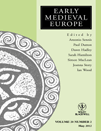
Early Medieval Europe
Connecting Disciplines to Reveal Historical InsightsEarly Medieval Europe, published by WILEY, is a distinguished academic journal that delves into the multifaceted history and cultural dynamics of the early medieval period in Europe. With an ISSN of 0963-9462 and an E-ISSN of 1468-0254, this journal provides a vital platform for scholars and researchers seeking to share innovative research developments within the field. Covering a range of disciplines including history and arts, it holds a category quartile ranking of Q3 in Arts and Humanities (miscellaneous) and History, alongside Q4 in Geography, Planning, and Development. Notably, it ranks #302 out of 1760 in the Arts and Humanities—History category, reflecting its significance and impact within the scholarly community. While devoted to the promotion of traditional scholarly communication, Early Medieval Europe also welcomes interdisciplinary approaches, making it a valuable resource for students, professionals, and academics interested in insights and advancements related to medieval studies. With an ongoing commitment to meaningful dialogue and exploration, this journal remains a pivotal resource for understanding the complexities of early medieval Europe.

Espana Medieval
Bridging Cultures through Medieval Spanish ScholarshipEspana Medieval is an esteemed academic journal dedicated to the exploration of medieval studies within the broader historical context of Spain. Published by the UNIV COMPLUTENSE MADRID, SERVICIO PUBLICACIONES, this peer-reviewed journal has established its reputation since becoming Open Access in 2004, thereby ensuring that vital historical research is accessible to a global audience. With an impressive Q1 ranking in History and a notable Scopus rank of 773 out of 1760, this journal plays a pivotal role in shaping contemporary scholarship in the field. Researchers and professionals can expect high-quality, rigorously vetted articles that delve into various aspects of medieval history, culture, and society, contributing to a richer understanding of the medieval past. Located in the vibrant academic milieu of Madrid, Spain, Espana Medieval continues to be a leading voice for historians, promoting innovative research and fostering academic discourse. Submissions from scholars worldwide are welcomed, encouraging a diverse array of perspectives on the medieval period.
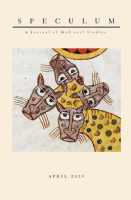
SPECULUM-A JOURNAL OF MEDIEVAL STUDIES
Navigating the Complexities of Medieval CultureSPECULUM: A Journal of Medieval Studies, published by University of Chicago Press, stands as a premier academic platform within the field of medieval studies. With an impressive legacy dating back to its inception in 1926, this journal has attracted scholarly contributions that explore the rich tapestry of human experience during the medieval period, encompassing areas such as history, literature, philosophy, cultural studies, and the visual and performing arts. It boasts elite rankings—Q1 in History, Literature and Literary Theory, Religious Studies, and Visual Arts and Performing Arts, with a commendable Q2 in Cultural Studies and Philosophy—attesting to its impact and relevance in academia. Although it is not an open-access journal, the rigorous peer-review process and critical scholarship found within its pages provide invaluable insights for researchers, professionals, and students alike. With a substantial Scopus ranking, ID 0038-7134, and E-ISSN 2040-8072, SPECULUM continues to serve as an essential resource for advancing knowledge and understanding of the medieval world, encouraging interdisciplinary dialogue and scholarly interaction.